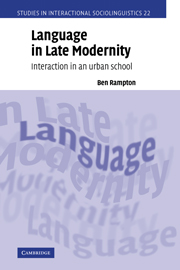Book contents
- Frontmatter
- Contents
- List of tables
- List of figures
- Acknowledgements
- Transcription conventions
- Part I Introduction
- Part II Urban classroom discourse
- Part III Performances of Deutsch
- Part IV The stylisation of social class
- 6 Language and class I: theoretical orientations
- 7 Language and class II: empirical preliminaries
- 8 Schooling, class and stylisation
- 9 Classed subjectivities in interaction
- Part V Methodological reflections
- References
- Index of names
- Subject index
9 - Classed subjectivities in interaction
Published online by Cambridge University Press: 22 September 2009
- Frontmatter
- Contents
- List of tables
- List of figures
- Acknowledgements
- Transcription conventions
- Part I Introduction
- Part II Urban classroom discourse
- Part III Performances of Deutsch
- Part IV The stylisation of social class
- 6 Language and class I: theoretical orientations
- 7 Language and class II: empirical preliminaries
- 8 Schooling, class and stylisation
- 9 Classed subjectivities in interaction
- Part V Methodological reflections
- References
- Index of names
- Subject index
Summary
In the last Chapter, I looked at the way in which, in one way or another, exaggerated performances of posh and Cockney coincided with the drawing of educational lines, and I suggested that these stylisations are best interpreted as small pieces of class analysis that speakers produce in media res in an effort to clarify their institutional positioning. In this Chapter, the focus turns to stylisation in peer interaction and it is based on a set of about twenty episodes where no one sought to exercise institutional control, but where something more than just the sound properties of posh and Cockney seemed to be involved. In the course of the analysis, it will become clear that class sensitivities were not confined to the work relationships associated with school, but that they were much more pervasive, manifesting themselves in quite personal aspects of these young people's social lives. And to do justice to this, it will be necessary to look beyond the traditional vocabularies of interactional sociolinguistics to wider discussions of subjectivity.
The chapter begins by comparing sociolinguistic conceptions of identity as a local interactional projection with the interest in more pervasive and enduring sensibilities that one finds in cultural studies and in other work on discourse, power and inequality in sociology, anthropology and literary theory (indeed henceforth, I shall use the term ‘cultural studies’ as a short-hand to stand for these as well).
- Type
- Chapter
- Information
- Language in Late ModernityInteraction in an Urban School, pp. 325 - 382Publisher: Cambridge University PressPrint publication year: 2006



